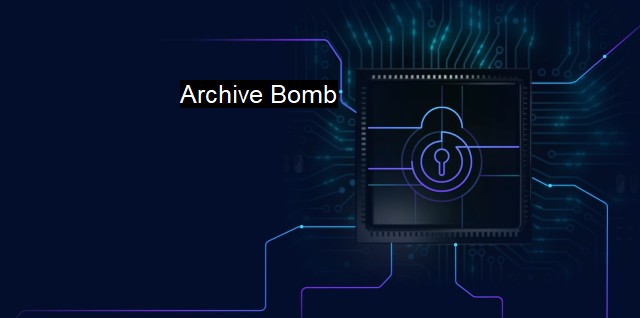What is Archive Bomb?
Overwhelming Cyber Attacks: The Threat of Archive Bombing and Strategies to Prevent them
An "archive bomb" is a cybersecurity term that refers to a maliciously crafted digital file designed to use up all of a system's resources when extracted. This class of digital threat typically manipulates the characteristic of data compression algorithms used in the construction of archive files, such as .zip or .rar, to wreak havoc in the target system. an archive bomb is a denial of service attack embedded in a seemingly innocent archive file.The concept of an archive bomb starts with a basic understanding of data compression. Data compression is a means of reducing the size of files by encoding information more efficiently. It is a critical functionality that allows sizeable data to be transmitted, stored, and retrieved without using undue resources. One of the principles that guide data compression is employing repetitive patterns. A sequence of similar characters can be represented with fewer characters, saving space.
The malefic trick of an archive bomb lies hidden behind this innocent functionality. It deceives the system by presenting an exceedingly compressed file that seems small, control such as few kilobytes (kBs) when in reality, it bloats to exorbitant sizes equivalent to several gigabytes (GBs) or even terabytes (TBs) after decompression.
In simplified terms, if a system or an unsuspecting user attempts to open an archive bomb, it proliferates suddenly, consuming all available disk space, thereby leading to an abrupt system slow down or even a total crash. This abrupt proliferation is akin to a "larger explosion" obtained from a "small package," giving it the name – archive "bomb."
Just as regular physical bombs can be manufactured in a variety of ways, archive bombs have their construction methods as well. An ordinary sequence of the same repeating characters or numbers, sometimes even just zeroes, is subjected to powerful compression onwards multiple layers to create this digital disaster. Then the highly condensed materially informative data poses as regular, benign files with a severely misleading ratio between compressed and uncompressed size.
Archive bombs have the potential to debilitate critical systems making them a substantial cybersecurity threat. They can be leveraged as tools for immense destruction in sectors with large-scale data systems like finance, healthcare, or telecommunications. The practical risk also extends to Average Joe with average computers, who can lose valuable data and nudge towards lackluster performance up to non-operability caused by an unexpected system crash.
Antivirus software plays a fundamental role in defending against the unwarranted proliferation of archive bombs. Like bomb squads that detect and disarm physical bombs, robust antivirus programs are devised to identify compressed files with stark disparities between their compressed and uncompressed sizes. some less technologically advanced antivirus software may unknowingly trigger archive bombs during the routine process of scanning for malicious files, leading to a self-induced system breakdown.
Cybersecurity remains the focal perspective on countering the mayhem of archive bombs and other malicious digital artefacts. Features like archive limits setting, usual behaviors recognition, multilayered protective designs, and individual security responsibility complement technology improvement in antivirus programs to avert archive-bomb induced disaster.
Hence, an archive bomb is a malicious file compressed to infinitesimal regular size that takes unexpectedly enormous shape once its cover is lifted. The unsuspecting action of decoding such a file can lead to a computer system doomsday with overwhelming resource allocation and probable data loss unless an effective antivirus system forestalls it. It's a stealthily crafted digital bomb that indubitably emphasizes the importance of robust cybersecurity preventing harmless-looking codes from escalating into catastrophic havoc.

Archive Bomb FAQs
What is an archive bomb?
An archive bomb is a type of cyber attack that involves creating a compressed archive file that is intentionally designed to consume significant amounts of system resources when it is extracted. This can lead to denial-of-service (DoS) attacks or cause antivirus software to crash.How does an archive bomb work?
An archive bomb works by using compression algorithms to create an archive file that contains a large amount of repeated or redundant data. When the file is extracted, the decompression process causes the system to allocate large amounts of memory, which can cause it to crash if there is not enough available.What can I do to protect my system from archive bombs?
To protect your system from archive bombs, you should ensure that your antivirus software is up-to-date and capable of detecting and blocking these types of attacks. Additionally, you should be cautious when opening email attachments or downloading files from untrusted sources, as these are common delivery mechanisms for archive bombs.What should I do if my system has been affected by an archive bomb?
If your system has been affected by an archive bomb, you should immediately disconnect from the internet and shut down your computer. This will prevent further damage from occurring. Once you have done this, you should contact a cybersecurity professional who can advise you on how to remove the archive bomb and restore your system to a safe state.| | A | | | B | | | C | | | D | | | E | | | F | | | G | | | H | | | I | | | J | | | K | | | L | | | M | |
| | N | | | O | | | P | | | Q | | | R | | | S | | | T | | | U | | | V | | | W | | | X | | | Y | | | Z | |
| | 1 | | | 2 | | | 3 | | | 4 | | | 7 | | | 8 | | |||||||